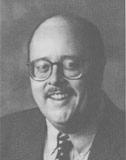|
Jim
Cameron
 It's
perhaps every business person's worst nightmare: you return to your office
from lunch and find a crew from "Sixty
Minutes" waiting in the
lobby. It's
perhaps every business person's worst nightmare: you return to your office
from lunch and find a crew from "Sixty
Minutes" waiting in the
lobby.
"We have only a few
questions," intones the
prosecutorial journalist as you
are videotaped running down the
hall and into your office,
slamming the door in his face.
Not
all media interviews need be as
frightening. In fact, knowing how
to get your message across to the
media can do a lot to actually
promote your business. The trick
is to be prepared.
You must go into every media
encounter with your own
messages... two or three points
that you want to get across
regardless of the questions you're
asked. What that message is
depends a lot on who is
reading/viewing/hearing the
interview and when. You must
tailor your messages for that
audience in terminology they can
easily understand.
Not all media were created
equal. Print interviews, for
example, are much harder than
broadcast despite their lack of
intimidating cameras and
recorders. Print reporters take
advantage of this seemingly
conversational approach and can
keep you chatting for hours... if
you let them. You must set the
guidelines for the interview: who
will speak for your company, on
what issues, where and when.
Radio interviews offer an
opportunity to narrowly focus your
message to a particular
demographic or psychographic niche
audience reached by the station
you're on. On call-in shows you'll
have plenty of time to deliver
your messages... even from the
comfort of your own home, as
stations now can have guests by
phone as well as callers.
Television is perhaps the most
challenging of the media because
of its brevity, complexity and
reach. Even a lengthy interview
may be distilled down to a
"sound bite" of but a
few seconds. But, with training,
you'd be surprised at how much
information can be conveyed in
that limited time... and how well
you can control what gets
electronically quoted from your
interview. Being a visual medium
you'll want to keep viewers
focused on your message rather
than your flashy attire,
ineffective body language or
shifty-eyed glances off-camera.
Here
are a few media DO's and DON'Ts
which I stress in my Media
Training Workshops:
- Know what you want to get
across in the interview. Build
a bridge of words from the
reporter's question to your
messages... and say them
several times during the
interview.
- Don't be afraid to admit
that you don't know the answer
to a question but instead
offer to find the answer and
get back to the reporter
before their deadline. Never
respond to questions based on
unfamiliar facts.
- Don't be rushed into
answering. Don't feel obliged
to fill "dead air"
after a tricky question. Just
pause, think... and then
answer.
- Don't use professional
jargon. Keep your message
simple, but not condescending.
- Find out as much as you can
about the reporter and his/her
story before you agree to be
interviewed. Have they covered
your business and its issues
before? Who else are they
talking to for this story? Do
you really want to be in that
mix? You can always politely
decline an interview. nobody
can force you to talk if you
don't wish.
- On TV, always dress your
part, projecting a cool,
clean-cut professional image.
- Don't look into the camera.
Instead, look at whomever is
talking. Avoid the temptation
to look at the monitor or
acknowledge other distractions
out of camera range. And
remember: you are always
potentially on camera, even if
someone else is talking. TV
Director's love "reaction
shots" of your expression
or body language when someone
else is verbally skewering
you.
- Project enthusiasm for your
messages. That attitude is
contagious. And if you're not
excited about your message,
the reporter and audience
never will be.
Finally... don't wait for the
media to come looking for you.
Reach out to them with story
ideas, professional commentary and
fresh ideas. Call your local
papers and radio/TV stations and
introduce yourself to the reporter(s) covering your
business. Briefly tell them about
your work and offer to be "on
call" to them should they
need your expertise. And follow up
with a note, a fact sheet and
business card. You'll be amazed at
their reaction as very few
business professionals are so
proactive.
With a little practice, these
interviewing skills will become
second nature. So the next time
Mike Wallace is waiting to ambush
you, instead of fear your reaction
might be more like: "Sure
Mike. I'd be glad to chat. In
fact, I have a few questions for
you!"
Copyright
Jim
Cameron
More
Articles | Submit
Your Article | PR
Subjects
About
Public Relations Homepage
Contact Us
|



